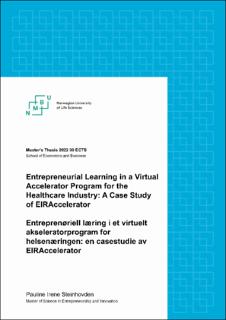| dc.description.abstract | Purpose - The primary objective of this master’s thesis is to further develop the theory of what promotes entrepreneurial learning in accelerator programs. The purpose of this thesis is to investigate which mechanisms and processes promote entrepreneurial learning within the "EIRAccelerator" and to examine the impact a virtual accelerator program for the health industry has on entrepreneurial learning.
Design/methodology/approach – The literature related to digital health accelerators and entrepreneurial learning was reviewed. This thesis utilizes the entrepreneurial learning framework developed by Pittaway et al. (2011), as well as theories on related entrepreneurial learning mechanisms. An abductive case study with a longitudinal design was conducted on the “EIRAccelerator”, an accelerator program offered by the Norwegian Smart Care Cluster for start-ups in the healthcare industry. This was in order to gain a more comprehensive understanding of how the virtual environment within an accelerator program and its program components affect a startup's learning experience. In-depth interviews with five pilot participants and a focus group discussion were conducted. During the research process, the researcher drew upon information gained from a needs assessment completed before the pilot accelerator program, as well as directly observing the “EIRAccelerator”.
Findings – This thesis presents a revised conceptualization of entrepreneurial learning that promotes a broader understanding of the phenomenon. The derived framework outlines four key principles of entrepreneurial learning: hands-on action learning, motivation, constructive feedback, and team learning. Further exploration of these principles was conducted in relation to the facilitating conditions that promote entrepreneurial learning in accelerator programs. According to the study, an accelerator program that is designed to foster entrepreneurial learning requires networking opportunities, mentoring, a test lab tailored to each company's needs, securing funding, and structuring and professionalizing the business model. It shifts the focus to the importance of building motivation, providing networking opportunities, and comprehensively testing product innovations in collaboration with potential customers and industry professionals in a customized test lab. By integrating these components, entrepreneurs enhance self-efficacy and build their networks, which is essential to gaining insight into market needs and ensuring sales success by customizing products to customers' needs. A virtual format provides participants with flexibility, but cohort companies would have preferred to meet in person at the beginning of the program to enhance group dynamics.
Originality/value – This thesis is the first to study and link the literature on virtual accelerators, entrepreneurial learning and digital health start-ups. It contributes to the literature on entrepreneurial learning by clarifying both learning conditions and program components critical for achieving entrepreneurial learning.
Keywords Entrepreneurial learning, Entrepreneurship education, Entrepreneurship, Virtual Accelerators, Virtual teams, Accelerated learning, Digital health, Cohort peers, Start-ups
Paper type Case study | |
